
Marietta is a city in, and the county seat of, Washington County, Ohio, United States. During 1788, pioneers to the Ohio Country established Marietta as the first permanent settlement of the new United States in the Territory Northwest of the River Ohio. Marietta is located in southeastern Ohio at the mouth of the Muskingum River at its confluence with the Ohio River 11 miles northeast of Parkersburg, West Virginia. The population was 14,085 at the 2010 census.
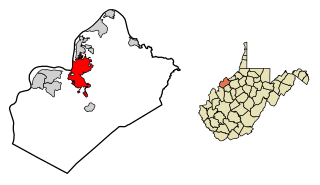
Parkersburg is a city in and the county seat of Wood County, West Virginia, United States. Located at the confluence of the Ohio and Little Kanawha rivers, it is the state's fourth-largest city and the largest city in the Parkersburg-Marietta-Vienna metropolitan area. The population was 31,492 at the 2010 census. The city is about 14 miles south of Marietta, Ohio.

The Northwest Ordinance enacted July 13, 1787, was an organic act of the Congress of the Confederation of the United States. It created the Northwest Territory, the new nation's first organized incorporated territory, from lands beyond the Appalachian Mountains, between British North America and the Great Lakes to the north and the Ohio River to the south. The upper Mississippi River formed the territory's western boundary. Pennsylvania was the eastern boundary.
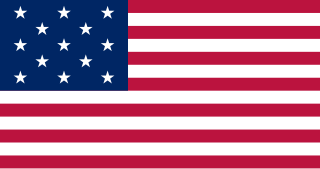
The Northwest Territory, also known as the Old Northwest and formally known as the Territory Northwest of the River Ohio, was formed from unorganized western territory of the United States after the American Revolutionary War. Established in 1787 by the Congress of the Confederation through the Northwest Ordinance, it was the nation's first post-colonial organized incorporated territory.
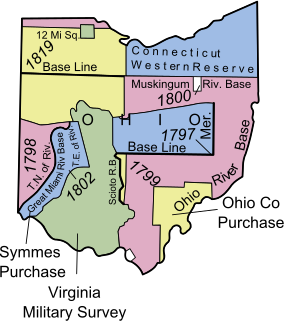
The Ohio Company of Associates, also known as the Ohio Company, was a land company whose members are today credited with becoming the first non-Native American group to settle in the present-day state of Ohio. In 1788 they established Marietta, Ohio, as the first permanent settlement of the new United States in the newly organized Northwest Territory.

Return Jonathan Meigs Jr. was a Democratic-Republican politician from Ohio. He served as the fourth Governor of Ohio, fifth United States Postmaster General, and as a United States Senator.

Rufus Putnam was a colonial military officer during the French and Indian War, and a general in the Continental Army during the American Revolutionary War. As an organizer of the Ohio Company, he was instrumental in the initial settling of the Northwest Territory in present-day Ohio following the war.

Marietta College (MC) is a private liberal arts college in Marietta, Ohio. It offers more than 50 undergraduate majors across the arts, sciences, and engineering, as well as Physician Assistant, Psychology, Clinical Mental Health Counseling, and Athletic training graduate programs. Its campus encompasses approximately three city blocks next to downtown Marietta and enrolls 1,200 full-time students.
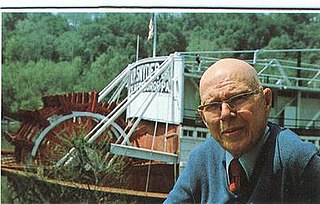
Fredrick Way Jr. was the youngest steamboat captain on the Ohio River and Mississippi River. He was the author of books on the boats that ply the inland waterways. He supervised the flat-bottom, stern paddlewheeler, the Delta Queen, from San Francisco, down the Pacific coast, through the Panama Canal, across the Gulf of Mexico and up the Mississippi and Ohio rivers to Pittsburgh in 1946.
William Stacy was an officer of the Continental Army during the American Revolutionary War, and a pioneer to the Ohio Country. Published histories describe Colonel William Stacy's involvement in a variety of events during the war, such as rallying the militia on a village common in Massachusetts, participating in the Siege of Boston, being captured by Loyalists and American Indians at the Cherry Valley massacre, narrowly escaping a death by burning at the stake, General George Washington's efforts to obtain Stacy's release from captivity, and Washington's gift of a gold snuff box to Stacy at the end of the war.

Mound Cemetery in Marietta, Ohio, is a historic cemetery developed around the base of a prehistoric Adena burial mound known as the Great Mound or Conus. The city founders preserved the Great Mound from destruction by establishing the city cemetery around it in 1801.

Benjamin Tupper was a soldier in the French and Indian War, and an officer of the Continental Army during the American Revolutionary War, achieving the rank of brevet brigadier general. Subsequently, he served as a Massachusetts legislator, and he assisted Gen. William Shepard in stopping Shays' Rebellion. Benjamin Tupper was a co-founder of the Ohio Company of Associates, and was a pioneer to the Ohio Country, involved in establishing Marietta, Ohio as the first permanent settlement in the Northwest Territory.
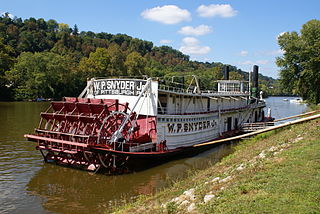
W. P. Snyder Jr., also known as W. H. Clingerman, W. P. Snyder Jr. State Memorial, or J. L. Perry, is a historic towboat moored on the Muskingum River in Marietta, Ohio, at the Ohio River Museum. A National Historic Landmark, she is the only intact, steam-driven sternwheel towboat still on the nation's river system.
American pioneers to the Northwest Territory included soldiers of the Revolution and members of the Ohio Company of Associates. During 1788 these pioneers to the Ohio Country established Marietta, Ohio, as the first permanent American settlement of the new United States in the Northwest Territory, and opened the westward expansion of the new country. General George Washington commented about these pioneers: "I know many of the settlers personally, and there never were men better calculated to promote the welfare of such a community." General Lafayette of France, who fought with the Americans during the Revolution, visited Marietta on his US tour during May 1825 and described these pioneers and former officers: "They were the bravest of brave. Better men never lived." The historian David McCullough noted that these pioneers were: "characters of historic accomplishment who were entirely unknown to most Americans".
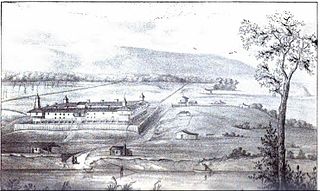
Campus Martius was a defensive fortification at the Marietta, Ohio settlement, and was home to Rufus Putnam, Benjamin Tupper, Arthur St. Clair, and other pioneers from the Ohio Company of Associates during the Northwest Indian War. Major Anselm Tupper was commander of the Campus Martius during the war. Construction began in 1788 and was fully completed in 1791. The Campus Martius was located on the east side of the Muskingum River, and upriver from its confluence with the Ohio River. A firsthand description of the fort is provided in Hildreth's Pioneer History,
Campus Martius is the handsomest pile of buildings on this side of the Alleghany mountains, and in a few days will be the strongest fortification in the territory of the United States. It stands on the margin of the elevated plain on which are the remains of the ancient works [mounds], mentioned in my letter of May last, thirty feet above the high bank of the Muskingum, twenty-nine perches distant from the river, and two hundred and seventy-six from the Ohio. It consists of a regular square, having a block house at each angle, eighteen feet square on the ground, and two stories high; the upper story on the outside or face, jutting over the lower one, eighteen inches. These block houses serve as bastions to a regular fortification of four sides. The curtains are composed of dwelling houses two stories high, eighteen feet wide, and of different lengths.

Anselm Tupper (1763–1808) was an officer of the Continental Army during the American Revolutionary War, a pioneer to the Ohio Country, and one of the founders of Marietta, Ohio, the first permanent American settlement in the Northwest Territory. The eldest son of Benjamin Tupper, Anselm enlisted in the fight for independence during 1775, while only eleven years old, achieving the rank of lieutenant before his seventeenth birthday. After the war, he was a pioneer and surveyor in the Northwest Territory, and became major of the militia at Marietta during the Northwest Indian War. Tupper was the first school teacher at Marietta, and was a classical scholar and poet. He was unmarried, and was known as a favorite in society.
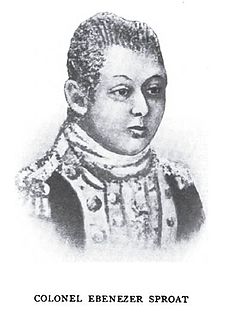
Ebenezer Sproat, surname also spelled Sprout, was an officer of the Continental Army during the American Revolutionary War, a pioneer to the Ohio Country, and one of the founders of Marietta, Ohio, the first permanent American settlement in the Northwest Territory. He served throughout the entire American war of independence, from April 1775 through November 1783, achieving the rank of colonel. After the war, he was a pioneer and surveyor in the Northwest Territory, and became a leader of the militia at Marietta during the Northwest Indian War. He was the first sheriff in the Northwest Territory and Ohio, serving fourteen years as sheriff of Washington County, the oldest county in Ohio.

The Colonel Joseph Barker House is a historic residence in Washington County, Ohio, United States. Located north of Marietta, in the Muskingum Township community of Devola, it has changed little since its construction in the early nineteenth century, and it has been designated a historic site.

Ohio History Connection, formerly The Ohio State Archaeological and Historical Society and Ohio Historical Society, is a nonprofit organization incorporated in 1885. Headquartered at the Ohio History Center in Columbus, Ohio, Ohio History Connection provides services to both preserve and share Ohio's history, including its prehistory, and manages over 50 museums and sites across the state. An early iteration of the organization was founded by Brigadier General Roeliff Brinkerhoff in 1875. Over its history, the organization changed its name twice, with the first occurring in 1954 when the name was shortened to Ohio Historical Society. In 2014, it was changed again to Ohio History Connection, in what members believed was a more modern and welcoming representation of the organization's image.

The Norwalk Reflector is a newspaper in Norwalk, Ohio, published Monday through Saturday, except U.S. federal holidays, in Norwalk, Ohio, United States with a daily distribution of approximately 5,600.

















